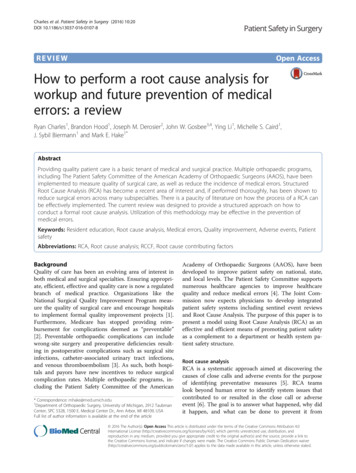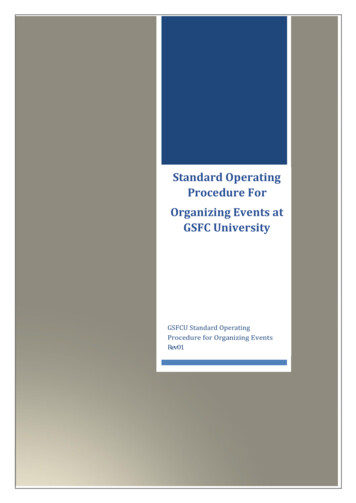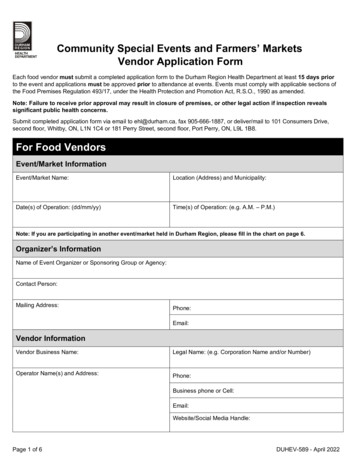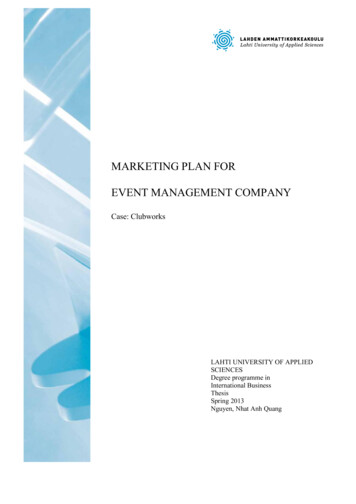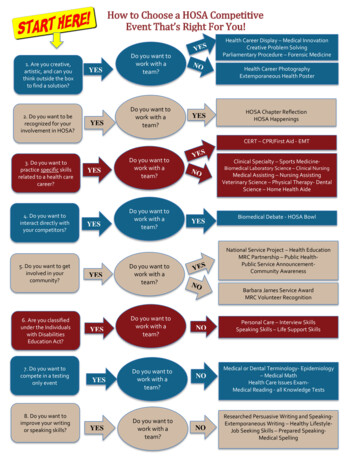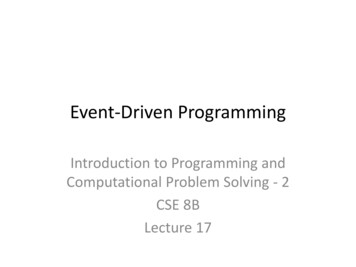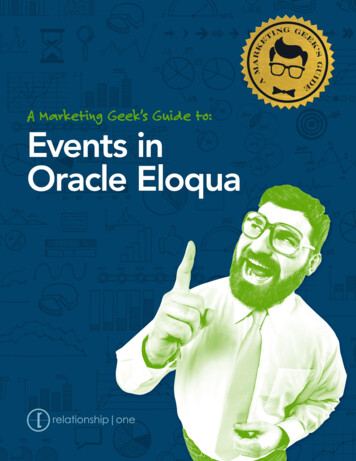
Transcription
9882.FM10/23/012:15 PMPage iSpecial Events
9882.FM10/23/012:15 PMPage iiThe Wiley Event Management SeriesSERIES EDITOR: DR. JOE GOLDBLATT, CSEPDictionary of Event Management, Second Editionby Dr. Joe Goldblatt, CSEP, and Kathleen S. Nelson, CSEPSpecial Events, Third Editionby Dr. Joe Goldblatt, CSEPCorporate Event Project Managementby William O’Toole and Phyllis MikolaitisEvent Risk Management and Safetyby Peter E. Tarlow, Ph.D.
9882.FM10/23/012:15 PMPage iiiSpecial EventsTWENTY-FIRST CENTURY GLOBAL EVENT MANAGEMENTTHIRD EDITIONDr. Joe Goldblatt, CSEPJulia SchiptsovaContributing Editor, Third EditionJOHN WILEY & SONS, INC.
fcopyebk.qxd11/5/012:36 PMPage 1Copyright 2002 by John Wiley & Sons, Inc., New York. All rights reserved.No part of this publication may be reproduced, stored in a retrieval system or transmitted in anyform or by any means, electronic, mechanical, photocopying, recording, scanning or otherwise,except as permitted under Sections 107 or 108 of the 1976 United States Copyright Act, withouteither the prior written permission of the Publisher, or authorization through payment of theappropriate per-copy fee to the Copyright Clearance Center, 222 Rosewood Drive, Danvers, MA01923, (978) 750-8400, fax (978) 750-4744. Requests to the Publisher for permission should beaddressed to the Permissions Department, John Wiley & Sons, Inc., 605 Third Avenue, New York,NY 10158-0012, (212) 850-6011, fax (212) 850-6008, E-Mail: PERMREQ@WILEY.COM.This publication is designed to provide accurate and authoritative information in regard to thesubject matter covered. It is sold with the understanding that the publisher is not engaged inrendering professional services. If professional advice or other expert assistance is required, theservices of a competent professional person should be sought.This title is also available in print as ISBN 0-471-39687-7.For more information about Wiley products, visit our web site at www.wiley.com.Some content in the print edition of this book may not be available for inclusion in this electronic version.
9882.FM10/23/012:15 PMPage vA public celebration is a rope bridge of knotted symbols strungacross an abyss. We make our crossings hoping the chasm willecho our festive sounds for a moment, as the bridge begins tosway from the rhythms of our dance.Ronald Grimes, Beginnings in Ritual Studies (1982, p. 231)
9882.FM10/23/012:15 PMPage vi
9882.FM10/23/012:15 PMPage viiDedicationIn 1913 my great-grandfather wrote to my maternal grandfather these words ofencouragement as he prepared to wed my grandmother:Dear Alcibiade,I write today to wish you and Leah all the happiness there is inmarried life. That your lives will be long and happy and that in casethere happens to be some little troubles in your youth you will besteadfast in your love to one another. If you do this you will conquerall and happiness will soon return.Their long and happy marriage produced two daughters, Rosa and Bertha,and seven grandchildren. These two proud Southern women often assembledour family around an elegant table for the purpose of celebrating a beautifulfamily. With eternal gratitude I dedicate this book to my remarkable motherand aunt. They first introduced me to the traditions and rituals of celebration.Through their steadfastness and love, the first seeds of celebration were planteddeep within me. The evidence of their enduring influence is apparent in thepages of this book.
9882.FM10/23/012:15 PMPage viiiSpecial DedicationThis book is dedicated to the members of the New York City Fire Department (NYFD); theNew York City Police Department (NYPD); the staff and rescue workers of the United StatesPentagon; the thousands of rescue workers in New York, Pennsylvania, and Washington, DC;the families of those who lost their loved ones; and the sacred memories of those individualswhose lives are forever enshrined in our global consciousness. May we always rememberthese acts of heroism, commemorate the sacrifices that were made, and commit to turning oursorrows into future celebrations through a renewed commitment to global understanding andlasting peace.Furthermore, the author has directed that a portion of the proceeds from this book be donated to the United States Red Cross Disaster Relief Fund to aid the families of those who losttheir lives as a result of the September 11, 2001, attack on America.
T ONETheory of Event Management1Chapter 2Welcome to Twenty-First-Century Global Event ManagementModels of Global Event Management35PART TWOEvent Administration3Chapter 4Chapter 5Chapter 6Developing and Implementing the Event PlanManagement of Human Resources and TimeFinancial Administration119Event Leadership145PART THREEEvent Coordination7Chapter 8Chapter 9Managing Vendor ContractsOn-Site Management189Accommodating Special NeedsPART FOUREvent Marketing10Chapter 11Advertising, Public Relations, Promotions, and SponsorshipOnline Marketing281PART FIVELegal, Ethical, and Risk ManagementChapterChapterChapterChapter12Chapter 13Chapter136163107157159241Risk Management: Legal and Financial SafeguardsMorality, Law, and Ethics in Event Management249251289291313ix
xContentsPART SIXTechnology and Career Advancement14Chapter 15Chapter 16Technology for Modern Event Management323Advancing Your Career in the Twenty-First Century333Case Studies in Twenty-First-Century Event Management12Appendix 3Appendix 4Appendix 5Appendix 6Appendix 7Appendix 8Appendix 9Appendix 10Appendix 11Appendix 12Appendix 13Appendix 14Appendix 15Organizations and Resources377Internet udio and Video Resources413Software415Sample Client Agreement419Sample Vendor Agreement423Sample Catering Menus427Sample Insurance Certificate431Sample Incident Report433Sample Purchase Order437Sample Event Evaluations439ISES Code of Ethics445ChapterAppendixAppendixIndex447321355
ForewordIt is with great pride and humility that I write this foreword. As a professionalnewspaper journalist for nearly a quarter of a century, this is my first attemptat executing this form of writing. But being the persuasive and charming person that he is, Joe didn’t ask me to do this—he told me. And he would nottake “no” for an answer.“You’ve known me all your life,” Joe told me. “And you’re a writer, a verygood one too. So write.”I reside in and am a native of the city of New Orleans, where every weekof every month there are dozens of special events taking place. Of course, likeresidents in other parts of the country, we celebrate the usual national and religious holidays. But here in New Orleans—in Louisiana—it is just as important to us what we celebrate as how we celebrate.And playing vital roles in the success of any celebration in my hometownare two important elements, music and food. You can rarely have one without the other.My culture celebrates and pays tribute to what some may view as the oddest of things, but for the Louisiana native, it seems perfectly natural. We havelocal festivals honoring such foods as andouille sausage, crawfish, crabs, catfish, shrimp, chili, pecans, strawberries, and gumbo.In New Orleans, baptisms, deaths, marriages, graduations, birthdays, anniversaries, and even school fairs are celebrated like they are no place else onearth. No one visiting this unique and diverse city should be shocked to seea group of jazz musicians playing a lively tune after a funeral.We celebrate and honor all forms and types of music, paying tribute to musicians of every race, class, and culture through every venue imaginable: onstreet corners, in hotel lounges, in neighborhood bars, under tents, in schoolauditoriums, and in concert halls.From January 6, we celebrate the start of the Carnival season with an eventcalled “Twelfth Night,” named for the twelve days after the celebration ofChristmas. For the next few weeks, prior to the start of the 40 days of Lent,we celebrate by attending daily parades and parties throughout the metropolitan New Orleans area.And as private organizations plan and execute elaborate, colorful, and festive parades and balls, those who are not members of these groups can stillenjoy the celebration of the Carnival season in their own way by simply being a spectator.Just about every weekend in the fall and spring, school fairs abound. Gonexi
xiiForewordare the days of such activities as fish ponds, ball throws, and strongmen competitions. To get the largest crowds, fair planners have to offer would-be fairgoers a variety of everything: food, games, arts and crafts, refreshments, andlive music. And booking the most popular, local band can become a yearround job.So you can see why it as important to those interested in special events,either as planners or attendees, to keep in mind that why people celebrate andhow people celebrate are of equal importance. From national conventions toschool fairs, from major sporting events to local football or baseball jamborees,keeping organized while knowing what the public wants is critical. I say thisknowing quite well that the author of this book is the utmost authority on howto organize an event, large or small. This book will help you fully understandthe why and how of celebration and so much more.If anyone epitomizes the title of “professional event manager,” it is JoeGoldblatt. I have known him for nearly fifty years, and together we have celebrated hundreds of family events. He has an uncanny and dare I say, brilliant, knack for making a quiet, family dinner into a memorable event. He isa special events master through and through, never passing up a chance toliven things up, to transform the tedious and mundane into the spectacular.From his childhood of performing magic tricks that included making Leah,his little sister, disappear from inside a special box, to his recent career inacademia, Joe has many gifts that few possess. In the midst of sadness, he canmake people smile. A happy occasion for Joe becomes a indelible memory.And Joe has no problem laughing at himself as he recalls the times from ourown childhood when he was the instigator of a practical joke but then laughedthe loudest when the joke was on him.Writing this foreword has been a wonderful opportunity to briefly sharewith you my view of what special events have meant to me and to the familyJoe and I experienced as children. So now it is time for you to celebrate andto make your own special memories, both personally and professionally, asyou join our family and follow my cousin Joe into the magical, memorableworld of professional event management.Eva Jacob Barkoff, Community News EditorThe Times-Picayune Newspaper, East Jefferson BureauNew Orleans, Louisiana
Preface“I am bringing shrimp, crabs, and crayfish.” Thus, my Aunt Bertha wrote tomy mother (her sister) in 1967 telling her of an upcoming visit she wouldmake to our home in Texas. My mother, a native Cajun who raised her familyin Texas, was surely excited about the upcoming visit of her only sibling. I amalso certain her mouth was watering in anticipation of the seafood that wouldsoon arrive with Aunt Bertha, who we lovingly called “Aunt T.”I felt a similar sense of anticipation when John Wiley & Sons’ senior editor, JoAnna Turtletaub, phoned me to ask if I would serve as series editor fora new project entitled the Wiley Event Management Series. According toJoAnna, through research, Wiley had identified the fact that the special eventsfield was expanding rapidly and needed new books to meet current and future educational demands of the profession. The first book in the series wouldbe the third edition of Special Events, which historically was the first academic textbook in the field. This book would be followed by three or fourbooks per year, to keep pace with the tremendous growth being experiencedby the field. The development of a series or canon of books in the emergingprofession of event management marks a new and major milestone in an ancient tradition (celebrating) and a modern profession (event management).The first edition of this book was entitled Special Events: The Art and Science of Celebration. This title reflected the ritual and ceremonies, as well asthe emerging technologies associated with this field. The second edition approached the field from a business standpoint, and the title became SpecialEvents: The Best Practices in Modern Event Management. However, the thirdedition has now addressed the major issue of the twenty-first century, and thatis the global environment in which events are now conducted. Therefore, thenew subtitle is Twenty-First Century Global Event Management.In the preceding edition I noted that the profession was experiencing dramatic growth and a move toward standardization through professional certification the Certified Special Events Professional [CSEP]) program sponsored bythe International Special Events Society). This growth has continued and evenescalated, giving further evidence of the need for an expanding body of knowledge. Examples of this growth are the George Washington University (GWU)Event Management Certificate and master’s degree programs. In the secondedition of this book I noted that GWU’s program enrolled 200 students annually. Now, only three years later, GWU educates more than 4,000 professionalevent managers annually. The new subtitle of this book, Twenty-First CenturyGlobal Event Management, also reflects how the profession (and, some wouldxiii
xivPrefaceargue, all professions) is changing. Today, GWU’s Event Management Programenrolls students from more than thirty different countries, and graduates holddistinguished and important positions around the world.The future is bright indeed for event managers equipped with the essential tools of experience and education. For the first time since the early development of the profession, classified advertisements appear regularly in major daily newspapers seeking event managers. To further assist employers,event management headhunting agencies recruit and match meeting plannersand event managers with employers. For the first time in the history of theprofession, event management is being formally recognized as something thatis valuable and unique and that is desirable as a career.A Bright Future for Event ManagersThe future of the event management profession is ripe with promise. This isdue to several factors. First, the growth in two-income families has propelledgrowth in the service industry. In record numbers, husbands and wives areturning to event managers to handle the details of their social life-cycle events.Second, the United States has become a nation of specialists. Those with specialized training, such as event management, are in demand by people and organizations that require specific expertise. As the event management profession grows through education, people employed as event managers will be ingreater demand. Finally, the event management profession incorporates multitasking skills that form a generic management base. For example, event managers must be marketing, human resource, and financial specialists to produceeffective events successfully on a continuous basis. Those trained in this fieldare able to use these highly portable skills to succeed in other professions,such as public relations or general business, where event management mayfall under the category of “other duties assigned.” As the economy continuesto be unpredictable and the labor force reinvents itself on a daily basis, eventmanagers are well positioned to anticipate and even prosper from thesechanges. A 1995 article in M & C Magazine described how, due to layoffs ordownsizing, many traditional meeting planners were using their meeting planning skills in other fields to earn new income. Event managers are even better positioned, as they are more broadly trained than meeting planners andthis training and experience will enable them to succeed more quickly in locating a new position if required.According to the Public Relations Society of America (PRSA), more than150,000 people practice public relations. Event management, according toPRSA, is one of the fastest-growing and most important trends in this modernprofession. Public relations is a discipline that grew out of journalism andpsychology. Although well trained in writing and research, few of its current
Prefacepractitioners have event management training, and this means new opportunities for trained event managers.Related profession is represented by the 12,000 television and radio stations in the United States. According to the National Association of Broadcasters (NAB), the majority of these stations have one or more people responsible for live station promotions. These events are usually managed by thosewith a marketing background but little or no logistics experience. Once again,this means opportunities for you in this expanding field.In my own profession of higher education there are more than 3,000 institutions, and each produces numerous events, ranging from convocation to commencement. Each university or college has at least one person or many peoplewho produce events full time and many more who are involved part time.The Challenge of ChangeThe multitude of changes that took place in the special events communityduring the recession of the late 1980s and early 1990s can be grouped intothree broad categories. First, the uncertain economic times had reduced spending for events, and firms that produced only mega or big ticket events were either out of business, merging, or slowly reinventing themselves. Second, technological changes, such as the rapid adoption of the facsimile, computer,modem, Internet, and other marvels of the modern age placed greater stress onthe special events community to accelerate delivery of ideas and events themselves. Finally, competition had magnified as the special events field turnedfrom a local business into a global one, and through downsizing, literally hundreds and perhaps even thousands of former event professionals working forcorporations and government agencies were now freelancing and competingwith the more established firms.These three trends—economic uncertainty, rapid technological advancement, and increased competition—produced a major paradigm shift within theevent industry. This shift occurred during the mid-1980s as the event industrywas feeling overly confident and expanded rapidly. Now the industry was inan era of economic uncertainty, technological change, and escalating competition and did not know how to cope or plan. This period, reflected by an uncharted course within and outside the industry, is where I began my researchto provide tools that would not only expand but also sustain this industry andhelp it meet the challenges ahead. The paradigm had shifted from an unformedgroup of professions known as special events personnel into an emerging discipline encompassing many professions known as event management.These professions are now required to prepare for the social, economic,and political challenges that confront established professions, such as medicine, accounting, and law. Event management has moved from infancy to adolescence and is now entering adulthood. In business terms, it has moved fromxv
xviPrefacebirth to growth to maturity and now faces complacency, which could be followed by decline or by reinvention and sustained growth through educationand strategic planning. The latter is what this book aims to do with your commitment as a professional event manager.How These Trends Affect YouThe growth in the rapidly emerging discipline of event management has beenunprecedented during the last 50 years and has certainly accelerated duringthis decade. Those event managers who respond to challenging economictimes with sound financial practices will produce consistently profitableevents. Those event managers who anticipate and adapt emerging technologies to support their emerging discipline will certainly produce more efficientand perhaps more profitable events. Those event managers who set qualitystandards and find the right market niche will help ensure that competitionis kept in check. These three trends—economic uncertainty, rapid technological advancement, and increased competition—are positive signs for eventmanagers, which is why this book is essential for your career and business.The first of these trends represents a unique opportunity to reinvent or perhaps for the first time actually define a profession. Second, these trends provide us with unparalleled technological innovations to produce more efficient, higher quality, and more profitable events. Finally, growing competitionallows us to improve and focus on individual strengths through serving nichemarkets. These three trends and the paradigm shift they form provide youwith an exciting platform from which to relaunch or build your career.Under Construction: A Blueprint for theProfessional CareerAll careers are constantly under construction. However, the more successfulcareers, including event management, follow a general blueprint to match actions to the final product. Although some careers happen by accident, mostare the result of a passion for a specific type of work, training, practice, professional networking, and that most ephemeral of experiences—timing.My definition of a perfect job is to find something you like to do so muchthat you would do it for nothing. Once you have found this type of job, thenext challenge is to find someone to pay you to do it. Event management isexactly this type of profession. This passion for helping people celebrate runsdeep among serious event managers. Some even see their work as part ministry rather than solely as a commercial profession.
PrefaceEducation: Your Unique JourneyTo fully realize the potential of this paradigm shift, you must begin your ownunique journey. This book is the first step in a continuous educational processthat you and millions of others are embarking on as businesses reinvent themselves at the speed of light. The changes identified in each field require skilledmanagers, marketers, and researchers with state-of-the-art and science tools.Only through continuous education can you make sure that you remain sharpenough to make your dreams come true.Two woodsmen decided to engage in a competition to see who couldbe first to chop down two mighty trees. At the appointed time onewoodsman began to chop furiously, swinging the axe forcefullyagainst the large tree. After several minutes the woodsman glancedover to the other woodsman and noticed that he was sitting againstthe tree cradling his axe. The first woodsman wiped the sweat fromhis brow and walked over to his challenger and asked why he wassitting down. “I am taking time to sharpen my axe,” said the wisechallenger. One hour later the first woodsman was still furiouslywielding his axe as he heard the sound “Timber!” and watched asthe second woodsman felled his tree. Is there any doubt how thesecond woodsman won this competition?Sharpening your skills through participation in professional organizations, attending educational programs, and networking with your peers is extremely important. This importance can be translated into bottom-line results.According to the U.S. Bureau of the Census, the more you learn, the more youwill earn. This is reflected among event managers whose educational attainments are significantly better than those of the average public, and perhaps asa result their incomes are significantly greater as well.The findings in a 1999 study of members of the International Special EventsSociety (ISES) showed that event managers now earn between 25,000 and 100,000 as compared with a median U.S. salary of approximately 23,000.More than one-third of U.S. event managers earn between 50,000 and 100,000.Correspondingly, the majority of event managers has earned baccalaureate degrees, and more than 20 percent has earned graduate degrees as well. The baccalaureate diplomas ranged from advertising to zoology. However, nearly 25percent have degrees in business administration, demonstrating the importanceof a solid grounding in this discipline. Noticeably absent were degrees in eventmanagement. Through specialization in this profession, you literally have thesame opportunities that physicians, attorneys, accountants, and other professions enjoyed over a century ago. The major difference is that these traditionalprofessions were composed solely of males; and it required decades beforewomen were admitted or given even marginal respect. By contrast, the eventmanagement profession was an equal opportunity career from the beginning.xvii
xviiiPrefaceGlobal OpportunitiesThere are numerous global business opportunities for event managers. Traditionally, a client develops close rapport with his or her event manager.Simultaneously, the event manager develops expertise into the client’s organizational culture, including the key employees who compose the decisionmaking core. Therefore, it is only natural that when an event held this year inNew York is held the following year in New Mexico or even Norway, the eventmanager will be asked to travel to that destination to maintain continuity. Thisimportant organizational or institutional memory is an important asset forevent managers to develop.Another asset that must be developed for the global marketplace is an understanding of the cultural, economic, and political nuances of each destination where an event is being held. Members of the International Congress andConvention Association (ICCA) told me that an event manager who wants todo business in Europe, Asia, or Latin America needs to spend significant timelearning the business practices and cultures of each country. Learning the language is considerably easier than understanding why people in that countrymake certain decisions and how those decisions may be influenced positivelyor negatively by the actions of the event manager.According to the members of ICCA, event managers who are planningglobal careers should speak and write one or more languages in addition toEnglish. The most popular languages are French, Spanish, and German. As thePacific Rim economy continues to develop, Japanese and Mandarin Chinesewill be added to this list. Furthermore, it was suggested by ICCA members thatglobal event managers must allow sufficient time to develop relationshipswith their global trading partners, as these contacts develop slowly and cannot be rushed. The goal is to establish a long-term partnership built on mutual trust.Event Management:A Multidisciplinary ProfessionThe most interesting finding of the ISES study was that only 50 percent ofevent managers’ work time was invested in the management of events. Thisexplains the multidisciplinary nature of this emerging discipline. Whetheryou currently are an administrative assistant or the chief executive officer(CEO), chances are that at some time you have had to organize a meeting orother event. You probably used transferable management skills to accomplishthis project. However, you soon realized that specialized training was alsoneeded to produce an effective event. Many students who apply for admissionto event management programs tell me that although managing events was but
Prefaceone of their job responsibilities, it was the one they most enjoyed. Therefore,they are seeking further training in this profession to improve their chancesfor long-term success doing something they truly enjoy. In learning thesehighly portable skill sets, they are simultaneously increasing their opportunities for long-term career success in many other professions as well.As I counsel these students I realize that the emerging discipline identified in this book as the profession of event management is part of a muchlarger movement. Millions of career professionals and those just starting theircareers are in search of work that is meaningful, financially rewarding, and,yes, fun. With the elimination of long-term security in most jobs, workers arenow in search of a career path that satisfies deeper longings in addition to financial compensation. They are turning to event management because it allows them to combine people, travel, creativity, and the tangible reward of seeing a project through to completion into a satisfying and rewarding career. Intheir eyes I see the excitement of real new opportunities and feel their determination to succeed in this profession. Through your efforts and those ofthousands of others, humankind’s oldest tradition is being transformed rapidlyinto the modern profession known as event management.The Profile of Event Management study has been conducted for more thansix years, and it has identified some important trends that will be analyzedfurther in this book. Event managers are committed to continuing education, with more than85 percent stating that they will continue their education throughouttheir careers.The most frequent type of continuing education will be industry seminars(held at conventions). However, nearly 10 percent will enroll in formalcertificate programs that lead to professional certification.Event managers are more technologically savvy than ever before. In the lasttwo years, Internet use has grown from 50 percent to more than 80 percent.Event managers earn more, with nearly 30 percent earning between 50,000 and 100,000.Women continue to outnumber men and earn more at all economic levels except 100,000 and above, where they earn only 5 percent less thanmen in this category. By contrast, in related but narrow professions, suchas meeting planning, women event planners continue to earn 15 percentless than men, although they outnumber men significantly.Event managers produce corporate human resource events more frequentlythan other types of events. This may be due to the demand for highquality emplo
The Wiley Event Management Series SERIES EDITOR: DR. JOE GOLDBLATT, CSEP Dictionary of Event Management, Second Edition by Dr. Joe Goldblatt, CSEP, and Kathleen S. Nelson, CSEP Special Events, Third Edition by Dr. Joe Goldblatt, CSEP Corporate Event Project Management by William O'Toole and Phyllis Mikolaitis Event Risk Management and Safety
